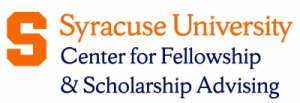10 Tips for Applicants to Nationally Competitive Scholarships from a Successful Rhodes Scholar
CFSA Director Jolynn Parker’s HNR 220 course, “Strategies for Scholar Development,” welcomed a special guest last Friday. Elliott Portnoy, a 1986 graduate of Syracuse University and SU’s first Rhodes Scholar, joined the course by telephone to share his experiences and advice. As a Rhodes Scholar, Portnoy earned his PhD at Oxford University in 1989. He later earned his JD at Harvard Law School. Portnoy is now the Global Chief Executive Officer of Dentons – the largest law firm in the world with 6600 lawyers in more than 50 countries.
Before a Q&A session with the class, Portnoy shared a list of ten tips for prospective applicants. His tips are applicable to all candidates considering nationally competitive scholarships.
- Go for it!
Portnoy advised potential applicants to resist the temptation to believe that they do not have a change at nationally or internationally competitive awards and to take a shot.
- Remember that the process is infused with luck
The award selection committees are composed of humans. Portnoy noted that the award selection process involves luck, and that on any given day, the results could vary hugely. While easier said than done, he suggested that students recognize the irregularity of the process and learn not to take results too personally.
- Have fun with the process
Portnoy urged applicants not to play it safe with their applications. Identify your “unique selling proposition” and have fun crafting an application that reflects it.
- Be yourself
What specific passion do you have that gives you that “fire in the belly?” Portnoy advised students to find it and stay true to it through the application process. Awards selectors are looking for memorable, specific details about applicants’ passions.
- Gain practical, real-world experience
Portnoy acknowledged that academic achievement alone does not set applicants apart; applicants must demonstrate real-world experience. Depending on the field of study, this may include research, internships, jobs, and/or extensive civic engagement. Portnoy also noted that while valuable, studying abroad is no longer a distinguishing feature for applicants because the majority of applicants have spent time abroad. Having internship or research experience abroad can make candidates much more competitive.
- Rely on Syracuse
Syracuse University is home to faculty and staff who want to see its students succeed. Portnoy recalled the professors and staff members who rallied behind him, helping him to prepare application materials and practice interviewing in front of mock selection panels. As a large research university, SU also has the resources to help students prepare applications.
- Find a rabbi
Portnoy recognized the importance of mentors, or “navigators,” both before and throughout the application process.
- Practice an elevator speech
Regardless of the award, applicants are expected to succinctly articulate their goals with selection committee members and peers. Beyond the award period, what will you do with your experience? How will the experience positively impact your future academic and professional goals? How will you use the experience to change the world? These goals can certainly change, but Portnoy suggested that students practice answering the question “What will you do with the ____?” Fill in the blank with the award to which you are applying and prepare a crisp answer that explains how the award fits into and contributes to your overarching goals.
- Practice interviewing
Interviewing for a competitive scholarship can be intimidating, and interviews are often conducted before a panel of judges or through multiple one-on-one interviews in quick (and grueling) succession. Students likely have not experienced a similar interview. It is essential to practice interviewing, preparing answers to common questions and learning how to articulate your answers clearly and concisely.
- Ask for help
Don’t go through the application process alone! Portnoy suggested that students reach out to mentors and the Center for Fellowship and Scholarship Advising (CFSA) for help.
Looking for more advice? Need to practice your elevator speech? Need a mock interview in preparation for a scheduled scholarship interview? CFSA can help! Contact us here.
